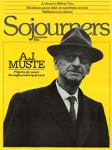In 1959 Muste joined the Committee for Nonviolent Action (CNVA) campaign in Nebraska. Bradford Lyttle, an absolutist pacifist, was one of the leaders of the demonstration and recalls that "as usual, A.J. was enormously helpful in dealing with the ministers, the press, and other elements of the community. For one thing, he so obviously looks like your father, and his attitude is so understanding and unaggressive that he can make contact with almost anyone. We started preparations early in 1959. Our target was the missile base in Mead, Nebraska, thirty miles southwest of Omaha ..."
The band of actionists maintained a vigil outside the Mead base for a month. On July 1, the morning of their nonviolent invasion, Muste, the first scheduled to climb over the fence into the restricted area, spoke to the crowd of the curious, the hostile, the converted, the police, and the press. He made clear his feeling that the action he was about to take was, in his own case, religiously motivated. Softly but firmly, Muste quoted at length from Isaiah: "For thus said the Lord Jehovah, the Holy One of Israel. In returning and rest shall ye be saved; in quietness and confidence shall be your strength. And ye would not: but ye said, No, for we will flee upon horses; therefore shall ye flee: and, We will ride upon the swift; therefore shall they that pursue ye be swift."
When Muste began to speak, there was some jeering from the crowd, but he soon commanded complete attention. Finally, he stepped up to the 4-foot fence, and slowly climbed over. Muste and the other 14 who broke the law had to climb the barrier twice. According to regulations, anyone trespassing on a military reservation must first be asked by the commander of the base or his representative to leave. If the trespasser refuses, he is then arrested. Muste climbed down on the proscribed side of the fence, was presented with a letter from the commander, and was ushered out through the gate. Muste read the letter, stepped to the fence, climbed over once more, and was placed under arrest.
Muste rejected bail, and spent nine days in an Omaha jail. "He had a hard time," notes the much younger Brad Lyttle. "It was hot, and the jail was a real hole. The food was terrible; A.J. was allowed no exercise; and only relatives were allowed to visit, but he had none there. By the end of his time, he was exhausted. I've never seen him so tired. Yet he remained unemotional. He betrayed how worn out he was only by the fact that his hands, which shake anyway, were shaking much more than usual. His pallor was marked, but his spirit was whole even though the guards had treated him with curt disrespect."
... The pre-trial stay in jail was not a unique experience for Muste. As a labor leader and later a radical pacifist, he had been imprisoned a number of times. A schoolmate of [A.J.'s son] John Muste remembers the boy saying occasionally during the early 1930's: "Well, it's probably time for Dad to be in jail again."
Muste's calm remains unbroken in jail. He reads, or jokes with his cellmates, and waits for bail, if he has decided to accept bail. During one incarceration in 1955, as an aftermath of the first civil defense protest action in New York, Muste and several pacifists, including a young, eager FOR apprentice, were held overnight. In the morning, the youngster rushed to where Muste was sitting, absorbed in the sports pages of the Times.
"Let's get up a statement, A.J.," he said impatiently. "We really ought to be working on one right now."
Muste looked up. "Relax. We'll get one ready later." And Muste returned to the box scores.
The demonstrators were bailed out, and that afternoon, at his office, Muste did compose a press release. "A.J. works hard," an associate of his in the War Resisters League noted at the time, "but he works at his own speed. In many areas, not all of them ideological, he is a man who will not be pressured."
Nat Hentoff was an author and regular columnist for The Progressive and The Village Voice when this article appeared. Excerpted from Peace Agitator: The Story of A.J. Muste, published by the A.J. Muste Memorial Institute. Used with permission.

Got something to say about what you're reading? We value your feedback!
